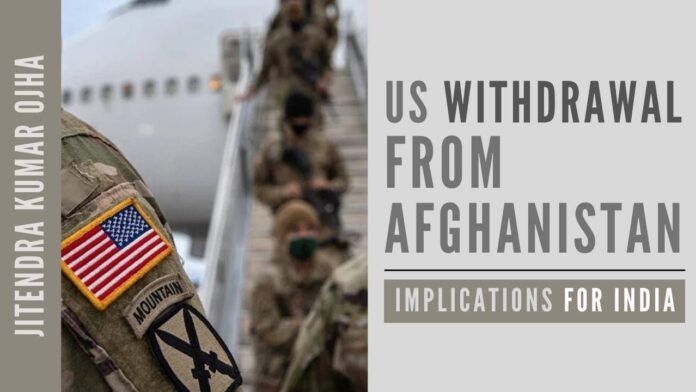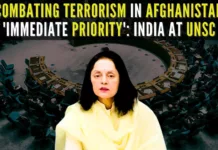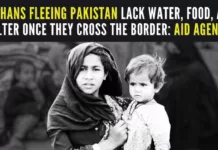
US withdrawing its troops from Afghanistan
US President Joe Biden’s April 14 announcement of the complete withdrawal of US combat troops from Afghanistan, the perennial graveyard of great empires, leaving the so-called war on terror inconclusive, continues to dominate the global discourse on security and geopolitics. Amidst apprehensions of the rising clout of terror groups in South Asia and beyond, many believe that such a move fulfils the Pakistani aspiration of beating America with the help of America itself in a covert war.
A write up in New York Times has referred to remarks by former DG Pak ISI (Inter-Services Intelligence), Hamid Gul often referred to as ‘Godfather of Jehad’ in Af-Pak during a chat show named ‘Mazaq Raat’ at Dunya News of Pakistan. Gul had asserted that ‘when history would be written, ISI would be credited with vanquishing the Soviets in Afghanistan with the help of America, to eventually decimate the Americans themselves with their own help.’ Gul, known for undermining civilian government to perpetuate de-facto military control of Pakistan and building an elaborate global infrastructure for radicalism, terror and organised crime, had emerged as the most credible public face of the Pakistani deep state.
Pakistani deep state has increasingly adopted typical ‘Mamluk’ strategy of war to successfully camouflage the self-seeking agenda of a few, even at the cost of security of the rest of mankind, including its own people, as a religious war.
He had stressed during this show that ISI was not a stick or watch in the hands of Pakistani rulers and had urged people to respect it as an army of the “Qom” (Islamic race). There is another media clip of Gul hailing Osama Bin Laden as a friend of Pakistan and boasting the success of the Pakistan Army in hiding the most wanted fugitive for nearly a decade before the latter could be detected by the West.
In the larger context of events, it only suggests that the Pakistani deep state had been confident from the beginning that they had succeeded in entrapping the United States in Afghanistan. And there was no way for the most powerful nation on the earth to extricate itself without facing a severe blow.
Pakistani deep state has increasingly adopted typical ‘Mamluk’ strategy of war to successfully camouflage the self-seeking agenda of a few, even at the cost of security of the rest of mankind, including its own people, as a religious war. Hence, treachery, deception, double-speak, back-stabbing and mass slaughter are justifiable instruments of such all-out war. Exploitation and loot of others and plundering of their resources, including human beings, for luxury and comfort of a few, was justified in the name of religion. Audacity or the ability to peddle brazen lies is an integral part of such a strategy. Hence, they continue to peddle lies like discrimination against Muslims in India but worse is the allegation of India’s involvement in cross-border terrorism.
They believe it was this strategy that helped relatively smaller groups of Mamluk-Mongol marauders vandalise the mighty, but fractured, the original civilization of the Indian subcontinent, where people had continued to practice ideals of “Dharma-Yuddha” (rule-based war in defence of justice). After a humiliating debacle in East Pakistan, now Bangladesh, they have increasingly resorted to deceptive and clandestine war through a host of proxies against virtually everyone.
Afghanistan also provides a large pool of radicalised cadres both for guerrilla and terror operations as well as lower-end functionaries in the global organised crime networks.
The media is awash with reports of the way the Pakistan Military, despite being formally allied with the United States, had continued to covertly support the Taliban in a war, where the US and the allied European nations have lost over 3500 soldiers, with over 25,000 serious injuries. The financial costs of the war have been estimated at US $2 trillion. It is believed to have derailed the economic and technological advancement of the most powerful democracy. As per a Brown University project, Afghanistan has so far suffered 43,000 civilian casualties since 2001, with a corresponding figure for soldiers and policemen, who bore the brunt of Taliban attack, estimated in excess of 70,000.
United States has also invested nearly US $700 billion in infrastructure for good governance, democracy, defence of human rights, education and employment, with a significant focus on women empowerment. India too has contributed nearly a hundred billion dollars in such initiatives and public infrastructure. But developments in this direction have failed to prevent well-oiled Taliban and allied radical machinery from intimidating large sections of the local population, especially in rural areas, into submission. Consequently, the Pakistani deep state has succeeded in protecting and preserving the most formidable sanctuary for terror, radicalism and narcotic cultivation that it has assiduously cultivated over four decades, exploiting emotions of religious identity.
As per the UNODC (United Nations Office on Drugs and Crime) report, the Taliban has been annually generating US $1.5 billion through heroin and poppy cultivation in Afghanistan. These cannot be processed and trafficked without the support of multiple global networks managed and coordinated by Pak ISI. As per informed sources, this revenue is peanuts compared to the overall volume of money generated by larger worldwide operations of organised crime directly coordinated by Pak ISI.
But Afghanistan also provides a large pool of radicalised cadres both for guerrilla and terror operations as well as lower-end functionaries in the global organised crime networks. Simultaneously, Pakistan deep state may also be eying proceeds from potential exploitation of vast metal and mineral resources in Afghanistan, estimated to be in excess of US $3 trillion, which China has been seeking to explore. The latter has signed a few deals without substantial progress so far.
Pakistani deep state has consistently demonstrated its utility for major powers. Its nexus with major terror groups and organised crime networks have been found extremely useful for a variety of purposes. Many established democracies have thanked Pakistan for its tactical assistance in neutralising minor terror modules. Pakistanis’ have not hesitated in sacrificing some of their own smaller pawns or utilising their interface with larger crime networks to assist European or other nations on minor counter-terror issues, where its own larger interests were not involved. After all, terrorists that it launches or criminals that it uses are only sacrificial lambs for larger strategic or financial gains.
The world of money-laundering, drug-trafficking, printing and circulation of fake currencies, betting, extortion, arms trafficking, street crime, high-end cyber-crime, passports and visas forgery etc., all are interlinked at one or the other level. Hence, many state actors, while resenting the presence of such Pak linked networks on their own territory, have been tempted, or even compelled, to use Pakistani clout with entities in this realm for a variety of purposes.
Pakistani deep state is also believed to have exploited its expertise in a variety of sophisticated organised crime, to build symbiotic linkages with sections of political, bureaucratic, media and civil society groups. This is not only in relatively fragile states but also in some of the stable democracies. Nevertheless, such entities and groups have their own dynamics that breed differences and disputes. Hence, Pakistan has also faced, to a limited extent, a boomerang impact for supporting terror and crime, which it quietly and brazenly attributes to India, without realising that in absence of an elaborate infrastructure, it is impossible to peddle organised terror.
Major global powers have always been suspected of depending on indirect assistance from the covert terror and crime infrastructure of Pakistan. Powerful sections of the US establishment have often been charged with tacit encouragement to Pakistan’s early ventures towards building infrastructure, radicalism and organised crime. US ambivalence to Islamist terror during the early years or its subsequent backing of Jehadi terror against Soviet Russia in Afghanistan lend credence to such perceptions. Today, China appears to perceive Pakistan’s terror infrastructure and its goodwill with organised global crime networks as a source of strength, worthy of exploitation for strategic goals.
Global Terror Index – 2020 observes the increasing spread of terrorism in certain parts of the world, especially sub-Saharan Africa.
In recent years, Turkish President Recep Tayyip Erdoğan’s flirtations with both Al Qaeda and ISIS (Islamic State of Iraq and Syria) have been well documented. Several media reports have cited remnants of ISIS and Al Qaeda frequenting Istanbul and maintaining a direct interface with Turkish intelligence. Erdoğan has made veiled threats against France to use even Islamist terror, without being explicit about it, but probably deriving confidence from his patronage to such groups or clout with them. His closer alliance with Pakistan only enhances his overall clout manifold. Pakistan’s role as interlocutor between the US and Taliban, and the choice of Ankara (Capital of Turkey) as the venue for the next round of talks between the US and the Taliban, only sum up the story in this direction.
The situation becomes particularly worrying with what appears a clear backing of China to the emerging axis of Pakistan, Turkey and Iran. While Xi Jinping regime would like major terror groups and their patrons to stay away from China’s own soft belly in Xinjiang, as well as Chinese projects in both Central Asia and Africa, an indirect engagement with such elements through Pakistan can help:
- Safeguard these interests or establishments.
- Prevent the emergence of any challenge or economic competition from actual or potential rivals.
This can vitiate global ambience for commerce, free trade and enterprise. China’s interests and stakes in Africa, Central Asia, Far-East, West Asia are well known. An indirect interface with such groups, backed by confidence in its own advanced destructive technological power, virtually offers it a tool to coerce states in these regions to plunder their resources or impose their own designs on them.
Global Terror Index – 2020 observes the increasing spread of terrorism in certain parts of the world, especially sub-Saharan Africa. This is something that may not be of much concern to the most developed West. But it can potentially have a strong spillover impact well beyond this region in the post-Covid scenario.
There are several other indicators suggesting that Africa may emerge as a new home for terror groups or an alternative sanctuary for controlled breeding of terror, alongside organised crime. Fragile states with a pool of volatile young population provide the most conducive infrastructure for terror. Besides Boko Haram and Al Shabab, several elements of Al Qaeda and ISIS have also managed to sneak into both Horn of Africa and Eastern Africa. Islamic State of Greater Sahara to a host of relatively smaller groups have made their presence felt in recent years.
The emotive appeal of identity-driven propaganda is also manifest in a series of lone-wolf terror attacks in Paris, London or even Washington DC. These have demonstrated that even a single motivated terrorist or small groups of such terrorists, which being a family in a recent case in Indonesia, can wreak havoc on open societies. If such people are well trained, probably the damage can be far more serious. Hence, even in absence of large organised terror groups, open societies are likely to be troubled. Oppressive societies can use their stronger surveillance capacities to impose a blanket curb, alongside stricter security countermeasures, to deny space to even lone-wolfs from inflicting damage to their elite or state institutions. Democracies may struggle in this direction.
India needs to be particularly careful as its overall vulnerability to terror remains fairly high. Since 2001, India has remained in the Global Terror Index’s list of 5 most vulnerable nations for nearly a decade. Even now, India has been ranked 8th after Pakistan and highly impacted nations including Afghanistan, Iraq, Nigeria, Syria, Somalia, Yemen. Given congenital Pakistani hatred towards India, with its worldwide terror infrastructure intact, and Chinese backing to Pakistan given the conflicts of strategic interests between the two countries, India has its task well cut out.
Challenges further magnify in the context of the fragility of many of its own key institutions and malignancy in sections of its police establishments. What manifested during a recent extortion cum crime network run by a policeman in Mumbai, in alleged collusion with a politician, could be the smaller sample of a larger rot. Such a phenomenon threatens to dent the advances made towards the development of formidable anti-terror and counter-terror capacities under the dynamic leadership of few brilliant professional leaders. Given the overall adversities amidst which India’s counter-terror professionals have handled and thwarted terror attacks has been commendable by all standards.
Simultaneously, in an increasingly interlinked world, terror sanctuary almost anywhere shall have some impact on India’s security interests. This is especially given its democratic character, large size and mixed population. But a Pakistan nurtured Islamist terror hub and global crime-terror network poses a direct threat. The choice is certainly not a spectacular and expensive war that can drain our national energies. It should be a series of smaller and less spectacular measures that deny space and opportunities for such elements to eventually bring a terminal end for them.
India needs to keep a particularly closer watch on subversive propaganda at home in the guise of democratic freedom. For larger credibility and efficacy of the approach, this must be done through a mechanism of rule of law instead of underhand coercion, which is likely to generate more problems than solutions in long run. Even counter-reactions to Islamic radicalism on social media, beyond a point, shall help feed Islamist propaganda for terror and subversion. This is especially in absence of an agile and swift mechanism of rule of law. Amidst all this, terror groups in the region and beyond have been continuously mutating and transitioning along with their counterparts in the world or organised crime, compounding the pressure on counter-terror professionals.
India needs an innovative approach, incorporating strategic and tactical, defensive and offensive as well as local and global dimensions, to build sustainable and effective capacities to deal with the threat, in all its dimensions, in its own unique context. American experience only demonstrates that a flawed approach, despite the best intentions, can seriously impair the long-term capacities and strengths of a state and civilization, howsoever mighty they may be.
Note:
1. The views expressed here are those of the author and do not necessarily represent or reflect the views of PGurus.
- India must evolve the idea of Democracy - September 29, 2021
- National Security Outlook of India: Need for a paradigm shift - May 14, 2021
- US withdrawal from Afghanistan: Impact on global terror & implications for India - April 23, 2021











Jitendra Kumar Ojha Ji
Thanks for your reply.
I agree that Sree Iyer spends lot of his precious time and energy and on his platform introduces thought leaders, academicians, eminent people and tries to do good for our country. His efforts are praiseworthy.
My concern is that since independence our country lacked “think tanks to plan for the next five decade and lobbists to influence few nations” since we have had enough of adhocism, hero worship and cultism now.
I certainly glance at your blog and revert.
Jitendra Kumar Oja, I came across this brilliant piece of write up after a decade.
Afghanistan is a notoriously difficult country to govern and is one amongst the poorest countries in the world, and 42% of the Afghanistan’s total population lives below the poverty line widespread in rural and urban areas inspite of USA spending US$ 700bn and India US$ 13Bn.
Thanks to Nehru Gandhi-Jinnah under Brits the Islamic Republic of Pakistan began on 14 August 1947 when the country became an independent nation in the form of Dominion of Pakistan within the British Commonwealth as the result of Pakistan Movement and the partition of India.
Hamid Gul’s prophecy on Qom is scary and a warning to India and his love towards Osama Bin Laden fathered by USA and mothered by Pakistan subject to correction leaves Indian internal security vulnerable! Further this Mamluk strategy must awake sleeping majority Indian community. There is no point in sloganeering and showcasing soft secular credentials. To take these threats from Pakistan now we need to befriend with Israel more and certainly not with flips USA and Russia a hand rag of China. I humbly feel that we need to appoint ex-defence personnel as governors in 28states and 7 UTs to safeguards our territories and maintain internal security with marshal powers since family oriented regional parties CMs are of no use. When USA suggested us to look after Afghan we refused due to reasons more than one and one man show attitude of PM Modi.
Based on Biden’s decision the US military finally has to bow out spending trillions of dollars in two decades and this is another version of Vietnam for USA.
USA and the then USSR played a nasty game in Afghanistan while China improved its economy and technology silently and now challenging and lording on the Globe with Wuhan Virus too!! Ultimately China may occupy Pakistan if not Jinnah’s dream of uniting all Muslims may to materialise with the help of Turkey and iran. It is time India must allow Baluch Govt in exile in India and break Pakistan into four provinces. We need Israel on our side. We need educationally and technically qualified politicians and certainly not from RSS stable. Drugs and film gang Sachin Vaze episode tells us how crooked Hindus turn antiIndian and GOI looks the other way instead of promulgating Presidents rule!
The implications are not too far to seek. At a future date Jobama Biden will clandestinely fund Pakistan and silently kill his own country inviting more than two million illegal immigrants while Nancy Pelosi will retire next year eating cups of ice cream on hourly basis with huge bank accounts and as a director of Hitech Company having big equity shares!
Being a student of Earth Sciences, three decades ago, the United States Geological Survey (USGS), through its extensive scientific research of minerals, concluded that Afghanistan may hold 60 million metric tons of copper, 2.2 billion tons of iron ore, 1.4 million tons of rare earth elements (REEs) such as $1 Trillion Motherlode of Lithium and Gold, cerium, neodymium, and veins of aluminium, gold, silver
The major mineral resources include chromium, copper, gold, iron ore, lead and zinc, lithium, marble, precious and semiprecious stones, sulphur and talc among many other minerals. The energy resources consist of natural gas and petroleum.
Sree Iyer Ji it is better to have another Hangout with Oja Ji.
Thank you Anand ji. I am grateful to Sree ji for having me on his platform and giving me an opportunity to connect with intelligent and sincere Indians like you. I am not a specialist but a generalist in area of national security and governance. I go beyond analysis to spell out a comprehensive vision of national security and governance in Indian and Indo-Asian context, which I have named as Indocracy. It will be pleasure to engage you and exchange more ideas at a mutually convenient time. Kindly do not hesitate to email me. I shall request you to glance through my blog @: https://www.democracyandgovernance.com;
I am not an academic or professional writer. But a decade long experience in student politics and civil society activism, and subsequently over a quarter century in a specialised wing of civil service offered me a unique exposure to geopolitics and national security. I hope our efforts can have some positive impact on India, which is critical for larger defence of rights and liberties of people across national divides as well as security and stability of global order.